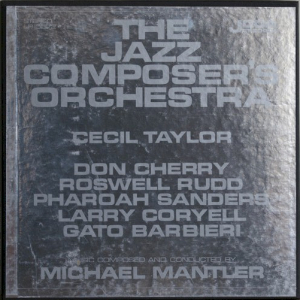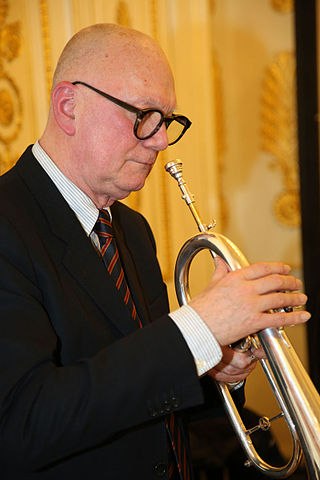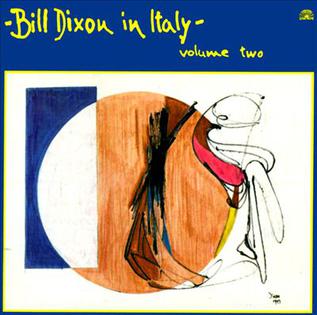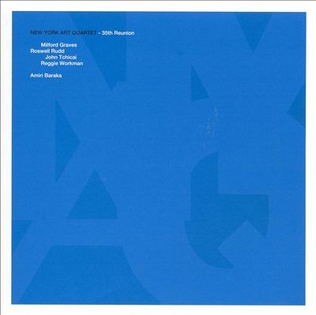
Steve Lacy was an American jazz saxophonist and composer recognized as one of the important players of soprano saxophone. Coming to prominence in the 1950s as a progressive dixieland musician, Lacy went on to a long and prolific career. He worked extensively in experimental jazz and to a lesser extent in free improvisation, but Lacy's music was typically melodic and tightly-structured. Lacy also became a highly distinctive composer, with compositions often built out of little more than a single questioning phrase, repeated several times.

William Robert Dixon was an American composer and educator. Dixon was one of the seminal figures in free jazz and late twentieth-century contemporary music. His was also a prominent activist for artist's rights and African American music tradition. He played the trumpet, flugelhorn, and piano, often using electronic delay and reverb.

Aldo Romano is an Italian jazz drummer. He also founded a rock group in 1971.

The Jazz Composer's Orchestra is a 1968 album by the Jazz Composer's Orchestra recorded over a period of six months with Michael Mantler as composer, leader and producer. Many of the key figures in avant-garde jazz from the time contributed on the album including Don Cherry, Pharoah Sanders, Gato Barbieri, Larry Coryell, Roswell Rudd, and Carla Bley. The album's finale features a two-part concerto for Cecil Taylor and orchestra.

Franz Koglmann is an Austrian jazz composer. He performs on both the trumpet and flugelhorn in most often in avant-garde jazz and third stream. An award-winning composer, Koglmann has performed or recorded with Lee Konitz, Paul Bley, Bill Dixon, Georg Gräwe, Andrea Centazzo, Theo Jörgensmann, Wolfgang Reisinger, Enrico Rava, Yitzhak Yedid, Ran Blake, and John Lindberg; together with the bassist Peter Herbert he has often musically accompanied works of the Austrian artist Heidi Harsieber.

Soul on Soul is the 14th album by trumpeter Dave Douglas and his first on a major label. It was released on the RCA label in 2000 and features performances by Douglas, Chris Speed, Joshua Roseman, Greg Tardy, Uri Caine, James Genus and Joey Baron. The album includes Douglas' interpretations of four compositions by Mary Lou Williams.

Consequences is the debut album by the New York Contemporary Five featuring saxophonists Archie Shepp and John Tchicai, trumpeter Don Cherry, bassist Don Moore and drummer J. C. Moses. The album was released on the Fontana label in 1966. In 2020, the Ezz-thetics label re-released the material from Consequences, along with the three NYCF tracks from the B side of Bill Dixon 7-tette/Archie Shepp and the New York Contemporary 5, on a remastered compilation CD titled Consequences Revisited.
In the 1990s in jazz, jazz rap continued progressing from the late 1980s and early 1990s, and incorporated jazz influence into hip hop. In 1988, Gang Starr released the debut single "Words I Manifest", sampling Dizzy Gillespie's 1962 "A Night in Tunisia", and Stetsasonic released "Talkin' All That Jazz", sampling Lonnie Liston Smith. Gang Starr's debut LP, No More Mr. Nice Guy, and their track "Jazz Thing" for the soundtrack of Mo' Better Blues, sampling Charlie Parker and Ramsey Lewis. Gang Starr also collaborated with Branford Marsalis and Terence Blanchard. Groups making up the collective known as the Native Tongues Posse tended towards jazzy releases; these include the Jungle Brothers' debut Straight Out the Jungle and A Tribe Called Quest's People's Instinctive Travels and the Paths of Rhythm and The Low End Theory.

Bill Dixon in Italy Volume One is an album by American jazz trumpeter Bill Dixon, recorded in Milan in 1980 and released on the Italian Soul Note label.

Bill Dixon in Italy Volume Two is an album by American jazz trumpeter Bill Dixon, recorded in Milan in 1980 and released on the Italian Soul Note label. The album resulted after producer Giovanni Bonandrini was so impressed by Dixon's sextet he requested them to record two albums instead of the single one that was planned.

We Thought About Duke is an album by trumpeter/flugelhornist Franz Koglmann and saxophonist Lee Konitz which was recorded in Austria in 1994 and released on the Swiss HatART label.

Morning Joy, subtitled Live at Sunset Paris is a live album by saxophonist Steve Lacy which was recorded in France in 1986 and first released on the hat ART label in 1989. The album was reissued in 2001 as Morning Joy and 2015 as Morning Joy...Paris Live with an additional track.

Itinerary is a live album by soprano saxophonist Steve Lacy, which was recorded in Vienna in 1990 and first released on the hat ART label in 1991.

35th Reunion is the third album by the New York Art Quartet. It was recorded at Avatar Studios in New York City on June 14, 1999, and was released in 2000 by DIW Records. It features John Tchicai on alto saxophone, Roswell Rudd on trombone, Reggie Workman on bass, and Milford Graves on percussion. Amiri Baraka, whose poem "Black Dada Nihilismus" was included on the group's debut album, also appears.

Red Snapper: Paul Murphy at CBS is an album by drummer Paul Murphy. It was recorded in June 1982 in New York City, and was originally released privately with limited distribution before being reissued by Cadence Jazz Records in 2003. On the album, Murphy is joined by saxophonist Jimmy Lyons, trumpeter Dewey Johnson, bassoonist Karen Borca, and pianist Mary Anne Driscoll.

Seasons is a live, triple-LP album by multi-instrumentalist Alan Silva. It was recorded in December 1970 at ORTF Studio 104 in Paris, France, and was released in 1971 by BYG Records as part of their Actuel series. On the album, Silva is joined by a large ensemble known as the Celestrial Communication Orchestra.

Broad Strokes is an album by trombonist Roswell Rudd. It was recorded during March 1999–January 2000 at various locations, and was released by Knitting Factory Works in 2000. On the album, Rudd appears in a broad range of ensemble contexts, with varying personnel.

Culmination is an album by multi-instrumentalist and composer Sam Rivers. It was recorded during September 1998 at Systems Two Recording Studio in Brooklyn, New York, at the same sessions that yielded the album Inspiration, and was released in 1999 by BMG France. On the album, Rivers is joined by members of the Rivbea All-star Orchestra: saxophonists Greg Osby, Steve Coleman, Chico Freeman, Gary Thomas, and Hamiet Bluiett, trumpeters Baikida Carroll, James Zollar, Ralph Alessi, and Ravi Best, trombonists Art Baron, Joseph Bowie, and Ray Anderson, baritone horn player Joseph Daley, tubist Bob Stewart, bassist Doug Mathews, and drummer Anthony Cole.

Considerations 1972–1976, Volumes 1 and 2, is a pair of live albums by trumpeter and composer Bill Dixon. They were recorded during 1972 to 1976, a period during which Dixon was teaching at Bennington College and was, in his own words, "in total isolation from the market places of this music." Released in 1981 by the Italian Fore label, the recordings help to document the gap between the 1967 album Intents and Purposes and the Soul Note albums of the early 1980s.

Opium for Franz is an album by trumpeters Franz Koglmann and Bill Dixon. It was recorded during 1975 and 1976 in Vienna and Paris, and was issued on LP with hand-made cover art by the small, obscure Pipe label, founded by Koglmann in 1973, and having a total of three releases in its catalog. In 2019, the album was reissued by the Black Monk label.



















